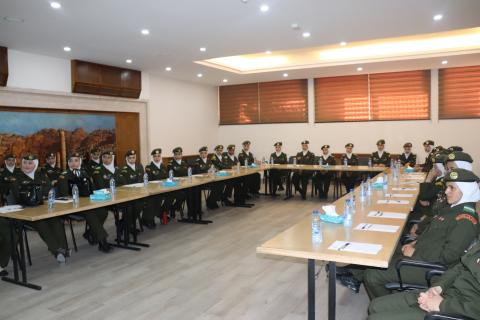

HPC General Secretariat held an educational meeting for thirty students at the Royal Medical Services College/ School of Midwifery. The meeting comes within the educational and vocational training program at the college by linking the medical knowledge and expertise of midwives to the state of reproductive health, needs and issues related in terms of information, advice, services and qualified health personnel.
The meeting began with a briefing by Major Ahlam Kharabsheh, leading person of the midwifery school/ Royal Medical Services College. Major Kharabsheh spoke about the college and the study plan for the midwifery specialization, and the skills and competencies the terms of which the college graduates are to comply with. Major Kharabsheh continued her briefing about the importance of linking the academic program for midwives with institutional and societal work based on studies and research conducted by the Higher Population Council.
Following that, Dr. Issa Al-Masarweh, HPC Secretary-General gave a presentation on pregnancy and childbirth in Jordan and the variation and range of pregnancy amongst social classes and amongst different nationalities.
Dr. Masarweh presented data on the rise of registered births in Jordan over the past ten years, the projected number of women of childbearing age and of pregnancies and births in the coming years. This, Dr. Masarweh added, means that there is a pressing need to increase the number of midwives who can work to provide care during pregnancy, at the time of birth and post-natal care as well, including providing services of up-to-date methods of birth control. All of these services, Dr. Masarweh stated, are crucial elements of primary health care, a cornerstone of the Jordanian Health care system.
Ms Rania Al-Abbadi, HPC Assistant Secretary-General, gave an elaborate and detailed presentation on a number of issues related to birth and pregnancy including spacing between births, the increasing percentage of caesarean section deliveries, the regulation of and common methods of birth control used in Jordan, and the sources from which to obtain them whether from the public and private sectors. Ms Al-Abbadi also spoke about the role of midwives in providing this service, the reasons and challenges behind the decline in the rate of using birth control methods, of the increasing percentage of couples/ spouses who have a need to use a modern method to regulate their childbearing and fulfil their reproductive desires, and finally of the many missed opportunities to meet this need at the various health facilities.
Badia Qubeilat, HPC Advocacy Coordinator, gave a presentation on the ‘National Strategy and components of the Reproductive and Sexual Health 2020-2030,’ which includes a frame of reference for the various partners in Jordan through which institutional plans and interventions necessary to achieve comprehensive access to integrated reproductive and sexual health services and information can be developed or harmonized.
Razan Al-Azzeh, HPC researcher, gave a presentation on practices and challenges of ‘Breastfeeding in Jordan’.
Ali Al-Mutlaq, HPC Director of the Studies and Policies Unit, gave a presentation on the Knowledge Platform for Reproductive and Sexual Health/ Share-Net Jordan and the mechanism for registering and membership.
Ghaleb Al-Azza, HPC Technical Director and Principal Researcher, gave a presentation on ‘Enhancing the role of parents in the reproductive and sexual health of their young children and adolescents.’
Itaf Al-Hadid, HPC Director of the Media and Communication Unit and Engineer Eid Al-Manaseer, HPC developer of web applications and technical support gave a joint presentation on the goals, mechanism and registration onto the electronic knowledge platform for reproductive health for youth ‘DARBY’.







